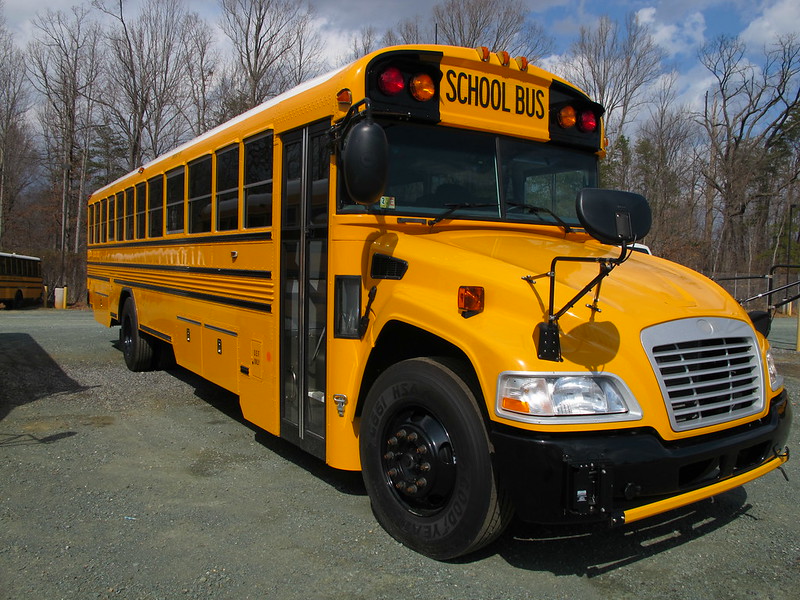As students around D.C. throw their backpacks onto their shoulders and clamber onto the school bus, some of our vendors reminisce about when they were students.
PATRICIA HENRY
“I was very excited when school would start in the fall; I looked forward to it,” Patricia Henry said. “I loved the first days of school; finding where new classes were, seeing the kids again.”

Henry lived in the country and said there was nothing to do in the summer. Occasionally she’d purchase paperback books from the nearby grocery store, but that became expensive.
But she couldn’t go back to school without new back-to-school clothes.
“One year my mother took me down to the dry goods store. There was very severe weather coming up, but I was complaining so my mother drove me anyway. On the way home, in front of an old folks home right at the stoplight, this big tree came crashing down! It must have been my punishment for complaining,” Henry said.
Henry always went to bed early, never slept past 7:30 a.m. and loved being awake early on cool summer mornings before a two-week church summer school and tennis lessons.
Although Henry loved school, she still loved to squeeze the last few rays of sun out of her summer. One year, Henry’s father took them to the beach the weekend before school. “I complained that I wanted to stay at the beach so we missed maybe the first day or two of school,” she said.
JEANETTE RICHARDSON
Jeanette Richardson lived in the District until she was 9 years old, where she attended Bruce and Harriet Tubman elementary schools. Afterward, she went to a foster home in Baltimore, where she attended Schools 88, 89 and Rock Glen Junior High, her favorite school of all.

Like most students, Richardson wasn’t such a fan of Monday mornings.
“My foster mom kept us in church from sun up ‘til sun down on Sundays,” Richardson said.
Physical education was Richardson’s favorite class at Rock Glen. She’d throw on her uniform T-shirt and shorts for her favorite sport: basketball.
“I played for a while [on the team] but I was a sore loser. I didn’t want to shake hands with anyone when we lost; I was just being a brat,” she recalled, laughing.
Richardson enjoys watching baseball now because of her time on the softball team as a catcher. “Come on pitcher, put it right here!” said Richardson, squatting, with her hand held out like a glove. Richardson’s favorite thing about Rock Glen was that there were “different units: A, B, and C in the building where the different grades would be; 7, 8, or 9,” she described. “I used to sneak out into all the other ones.”
One of her funniest memories was when her principal got hit in the face with a snowball. “He started fighting with my friend, so it was a big mess between white and black people, but my friend didn’t even throw it, and it got cleared up quick,” she said chuckling.
JEFF McNEIL
Jeff McNeil was into sports when he wasn’t strategizing on the chess team or reading about history and current events, his favorite subjects. He ran cross country, everything from 400 meters to miles upon miles. “I always came in second, third, never broke any records, but I was pretty fast,” said McNeil.

Toms River High School East in New Jersey also had the best wrestling team, McNeil boasted. He wrestled on the team in the whopping 120-pound weight class.
And being an athlete was probably good for more than physical health. “There were lots of pretty women, lots of girls in school,” said McNeil, who went to a lot of dances. The only thing McNeil would change if he could go back to high school is that he would have dressed a little nicer, and been a little more sociable.
“I was the only minority, only black kid in the high school,” McNeil said. “I lived in a predominately white neighborhood.”
But after school, McNeil dabbled in card games with his friends, poker especially. McNeil even “gambled” on his arrival to the District on July 4, 2008. He was choosing between Chicago, Boston, New Orleans and D.C. “I threw a dart and decided by process of elimination,” he said.
McNeil’s advice to students: “Get an education so you don’t have to sell newspapers. Make sure you get good grades; it’s a tough world today.”
LAWLESS WATSON
Lawless Watson wanted to join the football team, but a pretty girl talked him out of it.
“The only thing that kept me in school from the seventh to the tenth grade was music,” said Watson

.
Watson’s music teacher allowed him to take any instrument home for the weekend. He learned the basics of how to play about 16 different instruments as well as how to write and compose music.
If Watson could go back to D.C.’s McKinley Technical Vocational High School, it would be for the marching band and competitions, he said.
Watson mainly played the sousaphone in the band. Back then, before they became fiberglass, they used to be made of brass. At one time, he was the only sousaphone player in the band. He was also the line captain. “I loved making the bigger, stronger guys in the sousaphone line sweat by making them learn how to twirl and do stunts and various maneuvers while we marched,” Watson said. “Two of them were actually members of the neighborhood gangs, and they actually left the gangs to become part of the school marching band.”
Although Watson was a brass major in the school band, he also played the drums very well.
“Even though I did not take drum lessons in school, I was the best drummer, so if they needed one I was always pulled in,” Watson said.
Watson learned to play the drums at church. He spent his extra time there after school also studying scripture when he wasn’t working. Watson had a fulltime after-school job at McDonald’s that he started at 13 years old.
Watson eventually made a living as a freelance studio recording drummer.
“I cannot count the amount of time spent playing with local and national superstars,” Watson said.
Watson later studied broadcasting and now does freelance broadcasting on Internet radio and television. He has worked with both local and national organizations. “Whoever needs my voice,” he said.
KWAYERA “REGGIE” DAKARI
Kwayera “Reggie” Dakari grew up in the District and in Maryland. He attended both Davis and Plumber elementary schools in the District. In Maryland, he attended Maryland Park and Walker Mill junior high schools and Bladensburg High School. Afterward, he attended Bowie State University where he studied art education. He graduated from the University of the District of Columbia.

Dakari’s favorite school of all was Bladensburg, where he ran track. He also wrestled at Maryland Park. “I would win all the time. I was the littlest dude out there, 98 pounds back then,” he said. He was also on the gymnastics team, which did circus shows for fun.
On the academic side, Dakari was in the French club at Bladensburg. “I don’t remember a lot of French; if you don’t use it, you lose it,” he said. His goal was to go to France, but he never made it. “Un, deux, trois, quatre, cinq, six, sept, huit, neuf, dix—I can still count though,” he said.
“The kids I met are my memories,” Dakari said. Like many teenage boys, he loved meeting girls. He also started bands with his friends; the first was the Young Sound when he was 13 years old. Now, after all the bands in between, he’s in a band called CoJo.
“I was a musician since I was a kid,” he recalled. “See this harmonica? One of the baddest in the city,” he said, pointing to himself with one hand, harmonica in the other.
Dakari uses his artistic skill to train others how to go out and do their crafts. “I set up a flea market for artists to sell their work so we can all make a little money,” he said. Dakari sets up at farmer’s markets, jazz festivals and other events around the city where he sells his oil painting portraits.








